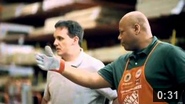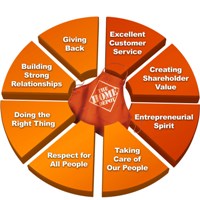The Missing Value at The Home Depot
 If you have ever done any remodeling, repair, or yard work around your house, apartment, or cottage you have likely made a visit to either The Home Depot or Lowe’s. They are respectively the largest and second largest home improvement specialty retailers in the world, and combined employ more than 500,000 people.
If you have ever done any remodeling, repair, or yard work around your house, apartment, or cottage you have likely made a visit to either The Home Depot or Lowe’s. They are respectively the largest and second largest home improvement specialty retailers in the world, and combined employ more than 500,000 people.
For those inclined to “do-it-yourself” (DIY), these retailers are like “home base” in the game of home improvement. It’s the safe house to ponder DIY ideas and find creative solutions to your home improvement problems. As you wander the isles of these big-box stores it’s kind of like visiting a Disney theme park, coming up with ever-new ideas to do, fix, add, create, build, etc.
Evaluating Core Values
Based on the size and scope of The Home Depot’s operation, how do they take control and take control and ensure thousands of employees remain focused on the right things? Core Values. Also known as Fundamental Values, these values set the bar for acceptable behavior.
But values can also be used to define unique qualities that create competitive advantage – called differentiating values. This is where The Home Depot is missing a golden opportunity.
 Consider the list of 8 core values posted on The Home Depot’s website:
Consider the list of 8 core values posted on The Home Depot’s website:
- Taking care of our people
- Giving back to our communities
- Doing the right thing
- Excellent customer service
- Creating shareholder value
- Building strong relationships
- Entrepreneurial spirit
- Respect for all people
Yes, these statements look very nice. Each one is very logical. And on the rare occasions when management review these, I’m sure they nod their heads with an approving smile.
Now…. here’s a test.
Review this list again and think about Lowe’s. Is there anything here that the thousands of employees at Lowe’s cannot or is not fulfilling?
There isn’t a single difference between these two giant warehouse retailers.
So what’s the missing value at The Home Depot that identifies what makes them unique? What differentiating value can they own that Lowe’s has not (yet) claimed?
The Value of POWER.
As a differentiating value, Power means the possession of controlling influence or authority; might and strength. This value would apply equally well to The Home Depot employees and DIY customers.
Just consider the authority that the value of power confirms upon all employees who offer customers their relevant experience in home improvement. Consider how much influence these employees possess when dealing with customers and the decisions they make.
Just consider how this power is shifted into the hands of DIY customers, filling them with the confidence to do things they might never have done before. Consider the might and strength they possess after discovering solutions to their problems via a simple discussion with a knowledgeable employee.
Do the smart folks at The Home Depot see this obvious fact?
Losing Their Way
Since The Home Depot launched in 1979, a critical branding element was the hiring of service reps (called associates) who were experienced in various areas of home improvement, such as plumbing, electrical, carpentry, painting, dry walling, gardening, etc. So when a customer wanted to talk to an associate about fixing a leaky toilet, for example, they could get advice from someone who could talk intelligently about plumbing issues. This proved to be one of the best business strategies that made them the fastest growing retailer in U.S. history (as claimed by The Home Depot).
But in the year 2000, Robert Nardelli took over as CEO. As a former GE executive, he brought the GE toolkit that nearly destroyed The Home Depot. Nardelli knew nothing about the retail business and applied his laser-like GE focus on improving operating performance.
One of the first things Nardelli did was promote the hiring of less knowledgeable part-time workers – because they were cheaper! In so doing, he decimated employee morale with the full-time “experts.” It didn’t take long for many of these experienced employees to leave, or worse, provide sub-par customer service. This in turn meant that the all-important “power” that DIY customers were so desperately seeking vanished.
Poof! The power was gone, from both employees and customers.
Sadly, it took 6 long years for The Home Depot board to finally see the light and remove Nardelli (sending him off with a whopping $210 million package!!). It then took many more years for the new management to work on repairing the damage done (and I would suggest the brand has still not fully recovered).
Thankfully, as part of the recovery process, there is a powerful underlying element that has resonated well for both customers and employees. It’s the consistent brand statement you may have heard many times in their TV and/or radio ads:
“That’s the POWER of The Home Depot”
Even if this message is subliminal, it’s hopefully starting to resonate (again) – inside and out.
Where’s the Power today?
The value of “power” is a powerful differentiating value. Not many companies could claim to own this value. In the home improvement space, Lowe’s can’t claim it. With their tagline “Never Stop Improving” their focus is on education, not power.
But The Home Depot could (and should) own this value.
So why haven’t they adopted “power” as their key differentiating value?
Here are three likely reasons:
- Management is still too focused on performance, and repair of morale, to recognize the opportunity.
- The Home Depot has become so large, it would be nigh impossible to get senior management to agree on a single differentiator.
- It’s less controversial to stick with the same 8 core values that any big company could adopt.
Maybe if the executives would just listen to their own ads, they might get the hint….
If you could make one recommendation to The Home Depot executives, what would it be?
Today’s value was selected from the “Effectiveness-Influence” category, based on the e-book Developing Your Differentiating Values.







